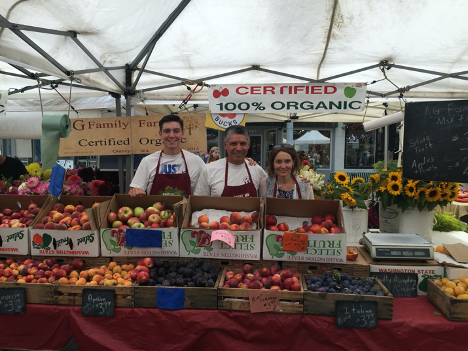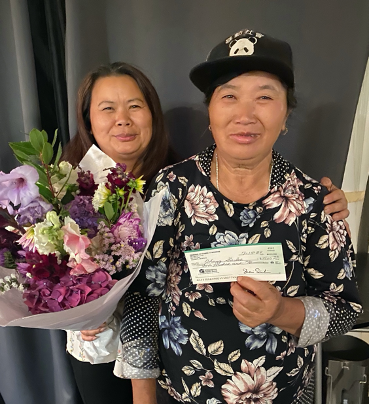
COVID-19 has challenged our agricultural system in an unprecedented way. Young farmers and ranchers have shown an unparalleled resiliency. They are keeping food banks stocked, creating new CSAs, and trying out online markets. All that while still moving us towards a farm future that is just and sustainable.
While federal relief efforts have overlooked protection and support of farm workers, farmers of color, and young farmers, we are profoundly thankful to allied organizations, who have worked tirelessly to bring COVID-19 relief funds to BIPOC farmers and young farmers in a way that is appropriate and equitable. Farm Aid raised over $400,000 for a national COVID-19 Farmer Resilience Initiative that worked with more than 120 local, state, and regional organizations across the country to pair immediate relief efforts with longer-term resilience strategies. The National Young Farmers Coalition was honored to participate in the organizing and distribution of funds across three regions: Northeast, Inter-Mountain, and Pacific Northwest.
In celebration of the resilience of farmers and ranchers nationwide and with deep gratefulness for the people who work to support us, we’d like to bring you the stories of two COVID-19 Farmer Resilience Initiative grantees.
Arturo Guerrero, AG Family Farm

Quincy, WA FarmAid grantee Arturo Guerrero, his wife Anne, and son Andy on their farm.
My name is Arturo Guerrero. I started farming back in 1998, when my brother and I bought 75 acres of land in Quincy, WA. In my teen years, I worked as a seasonal, migrant farm worker, and that gave me invaluable experience to help me farm today. Even though I had an agricultural background and studied ag business management in college, I honestly never thought that I’d have the opportunity to farm the way I do today. My brother was, at the time, a full-time orchard worker for a big company. He had a dream of owning his own piece of land, a dream that immediately came to mind when I came upon an ad in the paper for land in Quincy shortly after I graduated from college. Before we knew it, my brother and I went into business together and purchased the land. It was bare land. I mean, not even electricity or water–just pure grass. We started from zero. We started by farming only 2.5 acres. It was a lot of work. We didn’t hire anyone because we didn’t have the capital. From there, we kept on growing. Eventually, about 10 years later, my brother and I divided the land in half and started farming separately. He kept the whole orchard and I kept the other half, which was still bare land. So, I started from zero again. I started planting my half in 2013. Right now, I’m working off of eight acres and hope to finish my planting by next year. I grow over 120 varieties of fruit, including apples, pears, apricots, plums, and nectarines.
The farm is called AG Farms. Our last name is Guerrero and all five members of the family’s first names start with the letter “A.” My name is Arturo, my wife’s name is Anne, my oldest son is Andy, and then I have two other sons, Alec and Adam. They are no longer with us. They passed in 2016 in an accident but we always say that we are family of five and that I have three sons. That’s what AG stands for and we made sure to have all of our names on the sign at the market.
We’re very small in comparison to other large farm businesses, but we’re certified organic. We take care of our produce: we grow it, we pick it, we pack it. We do it all! 90% of the fruit only touches my hands and maybe my son’s. We deliver it directly to the market, as fresh as possible, usually a day or so only after we pick. People love that. We’ve been doing it for years now and we have developed a reputation for high quality produce. We have developed family relationships and truly care about our customers. We get to know their kids and their stories and they get know us. For example, my son grew up in the business. He’s going off to college this fall, and all of our clients at the farmers markets make sure to ask which school he plans on attending and congratulate him.
My son definitely wants to keep the farm in the family. He’s been so helpful with the markets. He has his jobs that he needs to do, and one of them is to complete the website. He’s almost done with that! We’re also on Instagram (@agfamilyfarm5). My son is the one who manages it. We’ve got to be out there and keep up in the world of social media!
Before the pandemic, this spring, I lost a lot fruit because of the frost. We normally get six or seven hundred boxes of cherries and this year, I probably got ten. That’s a whole corner of my farm that didn’t get any fruit.
As for COVID-19, I’ve noticed that people have been very supportive and very encouraging during this pandemic. All the people who come to the market seem to be buying more than before. But honestly, we’ve been affected by COVID-19 a lot. I sell at the Seattle Neighborhood Farmers Markets. Last year, we were doing four of that alliance’s markets: Broadway – Capitol Hill, Columbia City, Magnolia, and Lake City. This year because of COVID-19, we’re down to two markets: Broadway – Capitol Hill on Sundays and then Columbia City on Wednesdays. With COVID-19, we also started selling on WhatsGood, an online sales platform for the Farmers’ Market. We’ve been doing okay thanks to this online outlet. To be honest, it’s a lot of work on my end as a farmer. You have to prepackage everything and label it. At the markets, only so many people get to enter at one time. They cannot touch the product anymore. You have to bag and give them whatever they want. Every product has to have its own bag. So when customers want one pound of this and one pound of that, it’s a bag each time. That’s a cost. Our supplies keep going up and up and up and up. It’s a lot of extra work. Then there’s the whole protective equipment issue: wearing masks and gloves. We try to avoid handling cash so we had to upgrade our payment system.
It is very different. I think we’re just trying to survive. All of us. Some day we’ll come out with a vaccine or a cure for COVID-19 and we can go back to some kind of normal. In the meantime, small growers, we’re just we just trying to survive. And I haven’t been able to get any federal aid. I’m grateful that I got the Farm Aid grant but other than that, small growers don’t see much help.
Cheng Saelee, Cheng Chio Saelee Garden
My name is Cheng Saelee. I started farming flowers back in 1982. King County, UW Agriculture, and the Red Cross wanted to help Mien and Hmong families who migrated to the U.S. They came up with the idea of helping us continue what we knew best: farming. Back in the early 80s, the project was mainly based around vegetable farming. We grew all kinds of Asian greens and collard greens, mustard greens, peas. Later in the 90s, we started to do more flowers. Today, we still do vegetables, but not as much. Having vegetables tends to be a lot more work than flowers! You have to cultivate, weed, water. For a long time in order to water we had to pump. It was when the water pump broke and we weren’t able to fix it that I started growing flowers. We sell our flowers at farmers at markets all over Washington State. I primarily sell to Pike Market, where we have a stand.

We grow all the flowers we sell ourselves and we take care of them from day one. They’re as fresh as they come! We pick them the morning we go to the market and we don’t use chemicals.
When COVID-19 started we decided to either eat our vegetables ourselves or to give them away to food banks and to people in our community. With the flowers it’s been very different. When Pike market closed because COVID, we had no idea how to sell our flowers. We’ve never done anything else other than haul our flowers to the farmers market, sell them, and come home.
My granddaughter works in healthcare. She contracted COVID, came home, and then the whole family got it. We were struggling both financially and health-wise. She got it late April, during tulip and daffodil season. So our tulip and daffodils just went to waste at the farm. Through the end of May, we didn’t want to take the risk to be out there in the open and get other people sick. When May came, in spite of uncertainties, we planned for summer flowers. However, this year, the weather is so cool and there’s been so much rain in Washington State that the summer flowers are coming in ever so slowly. Pike market opened recently. Last Sunday was our second day back selling. It’s so slow. I have set up Facebook (“Cheng Saelee Gardens”) and we post pictures of our beautiful bouquets. At first, people were very interested and wanted to help, because it was new, but now it’s kind of died down. It’s been a very difficult season. We’re still continuing to do what we do, hoping that the year will turn around.
I applied for small grants to keep our business goin, but they just came back saying “unfortunately, you did not get it.” We hadn’t gotten any aid at all until we received this Farm Aid grant. We are very grateful for the support!